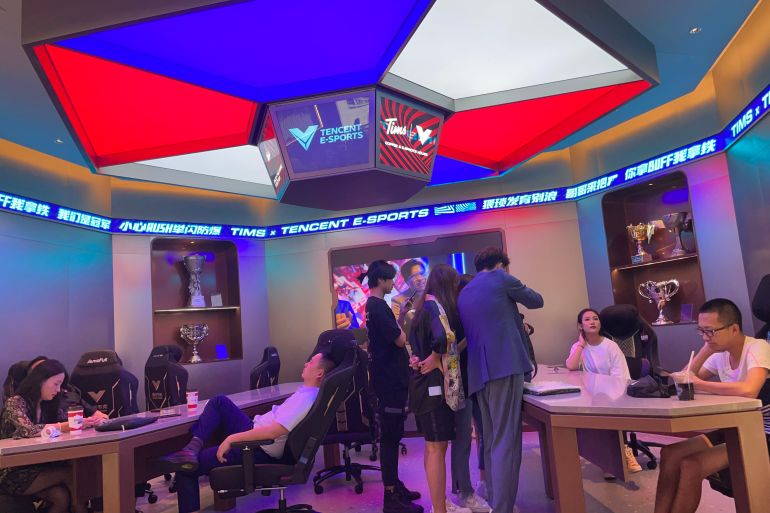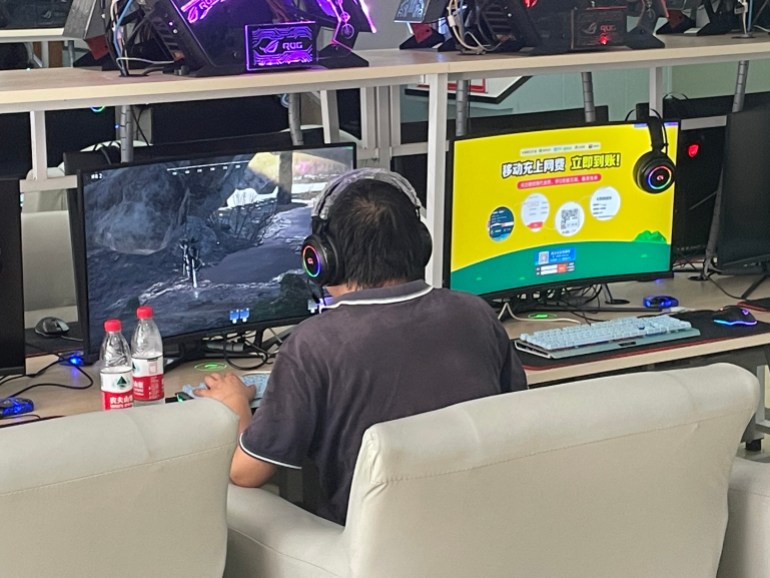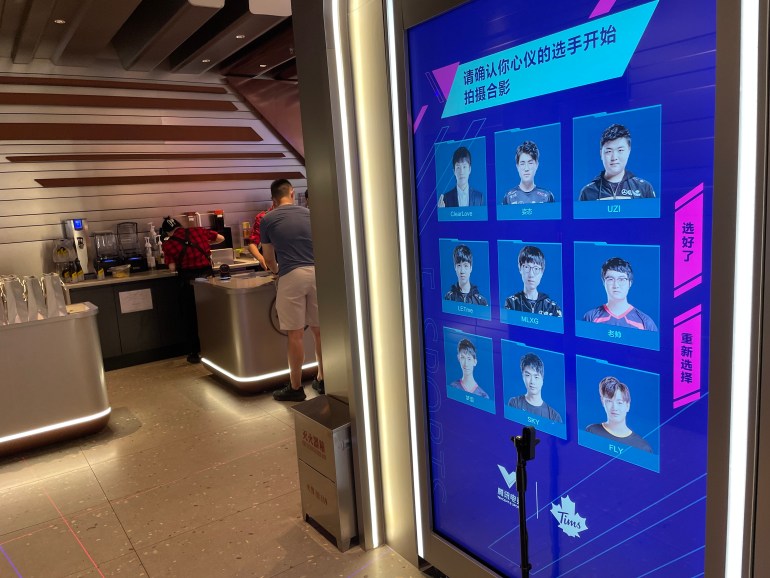Will teen gaming clampdown deal a knockout to China’s esports?
The attractiveness of a professional gaming career could wane for China’s teens following a government crackdown that restricts anyone under 18 to gaming only three hours a week, or one hour per day at 8pm on Fridays through Sundays.

Shenzhen, China – A steady lunchtime crowd of twentysomethings mill about the Tim Hortons and Tencent Esports Cafe, a newly opened venue to showcase professional video gaming in the heart of Shenzhen’s tech district of Nanshan.
Grabbing coffees, doughnuts and sandwiches, a few curious visitors pose for photos with virtual images of pro gamers on a large screen, or watch replays of esports tournaments on another screen from the same padded chairs that gamers often use.
Keep reading
list of 4 itemsAround the world, cinephiles say ‘meh’ to Hollywood’s Oscar nominees
Singapore’s PM defends Taylor Swift exclusivity deal amid regional grumbles
Singapore plays down payment to Taylor Swift amid grumbles from neighbours
China is the largest esports market, with over 400 million fans and viewers, according to the most recent numbers cited by state-run news outlet the People’s Daily. With numbers like that, placing bets on a venue like this seemed like a no-brainer several months ago.
Trouble is, while local and national governments had been supportive in the past of building up the games industry, competing to host tournaments and even allowing university courses in esports, new rules that took effect on September 1 have restricted anyone under 18 years old to gaming only three hours a week, or one hour per day at 8pm on Fridays through Sundays.
With state-run media and other government agencies describing video games as “spiritual opium”, the new restrictions appear set to deal both short- and long-term damage to the gaming industry in China, with those long-term impacts likely the most painful for professional esports.
This week, the Chinese government signaled how serious it is about enforcing the new rules after state-run news agency Xinhua reported that regulators had summoned gaming firms including giants Tencent Holdings and NetEase to discuss the new restrictions.

Regulations have been in place since 2018 requiring real-name identification, and the number of hours teens played per day was limited to 1.5 a year later. But the latest rules are more strict and go much deeper in terms of potentially weaning teens off their interest in gaming.
“With real-name authentication a must, new players who want to try the games anonymously before deciding to be a regular player might be turned off from trying,” Eason Zhang, a games developer based in Shenzhen who has been involved in the field for over a decade, told Al Jazeera.
Those previous restrictions three years ago already pushed gaming titans like Tencent and NetEase to further expand abroad instead of mainly focusing on the Chinese market. That trend is expected to continue.
“It meant that a lot of game developers in China shifted their priorities to themselves, either developing games just for the domestic market, or to try to reach the global market industry, with localised titles or specialised titles that launch around the world first, and then come back into the mainland,” Daniel Ahmad, an analyst at Niko Partners in London, told Al Jazeera.

Revenue hits from the latest restrictions are unlikely to dent profits for the biggest games companies, with only around 1 to 5 percent of revenue coming from the around 110 million teens playing online video games in China, Ahmad said. With around 97 percent of people between the ages of 18 and 24 engaging in games in some way, the short-term impacts are unlikely to be great.
“Gaming is part of the culture, and China is the largest games market in the world,” he said. “This isn’t something that is suddenly disappearing overnight for minors, even though the limits are extremely harsh. It’s still part of the culture. Parents of minors today have grown up with gaming, so they’ll be more liberal minded and may be more open to letting their children use their accounts to play games.”
Online backlash among teens has been strong, with comments on social media network Weibo noting how unfair the policy is and questioning how teens will be able to “relax” now, and even whether it will affect their creativity.
Some jokingly brought up other recent top-down policy moves by the government such as the three-child policy, with one person posting on Weibo: “For all the adult gamers, don’t jeer at minors too hard now, because who knows if there will be a policy someday that requires you to prove that you have a spouse and at least three kids before being allowed to log into your games.”
A Weibo user with the handle “Betty” questioned how big of an impact the rules would have on the esports industry.
“How will it impact esports? Players are usually younger and have ‘trained’ for years. High school kids who just finished Gaokao [college entrance exams] won’t be able to play as well.”
Starting young
The forecast by “Betty” about waning youth enthusiasm for gaming could prove correct.
Scanning through the bios of pro esports gamers with whom people can pose for virtual photos at the Tim Hortons and Tencent Esports Cafe reveals that most of them started gaming in their early teens. Some became professionals at just 14 or 15, fine-tuning their motor skills and tapping ability with nimble fingers.

“The age restrictions will drive a lot of young pro gamers to not get engaged with esports, so I think that will be one of the major impacts,” said Cui Chenyu, an analyst at tech consultancy Omdia in Shanghai. “These leagues train gamers to improve their gaming skills and they’re starting very young,” she told Al Jazeera.
Ahmad wonders whether the harsh restrictions might mean that people who turn 18 will not have the same gaming habits those from the past decade developed, meaning they may not play as much or spend as much or engage with games like their recent elders. Cui echoed the same concerns that the games industry will have to deal with.
“When they grow older, they aren’t accustomed to play[ing] games and they may prefer to watch videos or live streaming, so when they grow older gaming may not be an important part of their entertainment,” she said. “So that is the long-term impact for revenue growth for these companies.”
Johnny Chen, a former games developer in Shenzhen who has now moved on to producing online novels, said that previous restrictions had already started to change the habits of teens, and that the latest rules will only cement those changes further.
“It will have a big impact on the user base,” Chen said. “There won’t be as many players as before.”
Longer-term questions
While both Ahmad and Cui thought the short-term impacts would be minimal, questions linger about longer-term impacts, particularly for professional esports.
“There’s certainly going to be some questions going around about what this means for esports going forward,” Ahmad said.
Overall support for the industry had been strong since China recognised it as a sporting event in 2003, he said.
Recent concerns about gaming addiction and a more conservative leadership under Chinese President Xi Jinping, particularly related to the education of China’s youth, have led to a rethink among top-level officials.
Ahmad said that esports operators have already begun increasing the minimum ages for which players up to 18 years old can compete as part of a self-regulation measure, though it is likely the government will later set that rule in stone.
“If you’re between 16 and 18 and you’re competing in an esports tournament, you’re not going to be able to do that anymore,” Ahmad said.
Most players start considering esports as a profession at 14, 15 or even younger, he added. They are scouted at that age and any restrictions on their training could be a significant setback for anyone underage.
“There’s a chance that it will essentially reduce the talent pool that esports organisations can pick from,” he said. “It may be more difficult to recruit the right people or the best people, and there might be some talent loss from the development stage.”
Treating or feeding a habit?
Much has been made about gaming addiction in China, with special camps set up to wean addled minds from the spiritual pollution of gaming, as well as softer approaches at youth mental health clinics across the country.
Attempts to talk to staff and potentially teens having trouble with their gaming time management at a clinic in Bao’an district were rebuffed on a recent visit there. Various pamphlets around the centre openly discussed the issue of internet addiction, and staff there said they were working on a major report about the problem of online games addiction. They declined to comment on the extent of the issue or anything from the forthcoming report.
While it may be a problem for some students, others just want to play, and may convince their parents to let them do so, Ahmad said.
“It is worth noting that there are loopholes that children can utilise in order to play for longer, whether it is using their parents’ account and their parents let[ting] them play for longer, or if they want to, for example, use a VPN [virtual private network] to play global games systems or even buy a fake ID to pretend to be an adult.”
A worker in his 20s at the counter of a gaming cafe with around two dozen high-powered computers humming away in the background on a weekday afternoon said he currently plays around three to four hours a day, and started playing when he was about 13.
“I think it’s a good policy for kids, though, because they should focus more on their studies,” he said, perhaps questioning his own life choices.